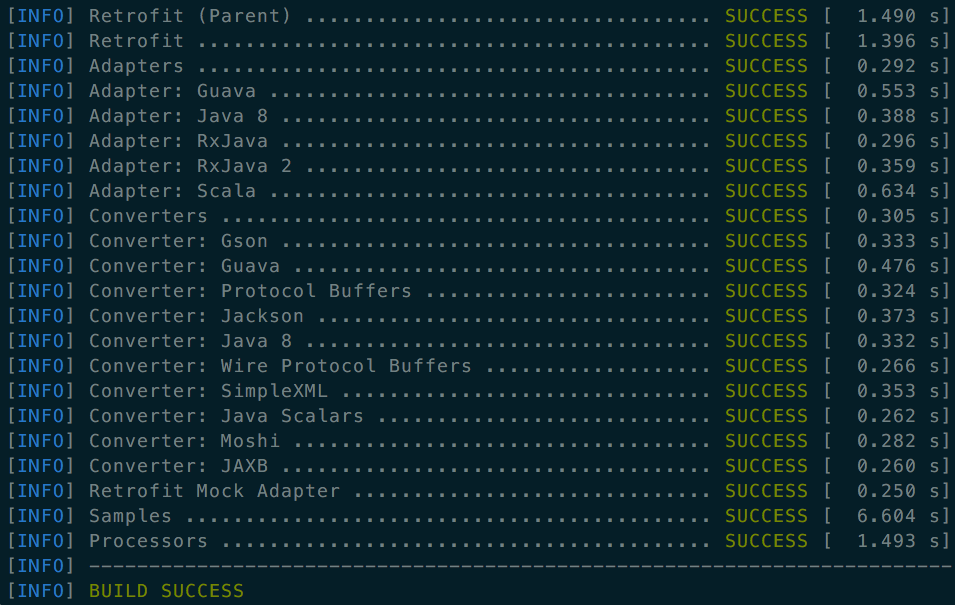起因
最近给 retrofit 写一个子项目 retrofit-processors时遇到了一个问题:我在父项目根目录下执行 mvn compile 非常正常,然后 mvn test 炸了,报的错是
1
Undefined reference: boolean javax.lang.model.element.ExecutableElement.isDefault()
Undefined reference???,那我怎么编译过的?而且 boolean javax.lang.model.element.ExecutableElement.isDefault() 难道不是 Java8 的 API 咩?
折腾了半天才发现这是因为父项目 pom.xml 里面的插件:
1
2
3
4
5
6
7
8
9
10
11
12
13
14
15
16
17
18
19
20
<plugin>
<groupId>org.codehaus.mojo</groupId>
<artifactId>animal-sniffer-maven-plugin</artifactId>
<version>${animal.sniffer.version}</version>
<executions>
<execution>
<phase>test</phase>
<goals>
<goal>check</goal>
</goals>
</execution>
</executions>
<configuration>
<signature>
<groupId>org.codehaus.mojo.signature</groupId>
<artifactId>java16</artifactId>
<version>1.1</version>
</signature>
</configuration>
</plugin>
这玩意儿是什么意思呢?
大概意思就是在 maven lifecycle 的 test 阶段检查我所使用的部分 API 是否与 signature 中所签名的 API 是否兼容,org.codehaus.mojo.signature.java16:1.1 显然就是指 JRE-1.6 的 API signature 了。
而我在子项目中使用 boolean javax.lang.model.element.ExecutableElement.isDefault() 这个 Java8 才有的 API 导致 test fail。
Animal Sniffer
就这样在机缘巧合之下我看了下 Animal Sniffer 的文档:它是 maven 上的一个插件,虽然整个项目有点凉( GitHub 上只有三十个星星),但看起来挺实用的。
Animal Sniffer 一共提供了两个功能,build 和 check;build 就是根据一个项目生成它的 API signature;check 很显然是根据配置的 signature 对项目进行检查。
Build
Animal Sniffer 既可以 build JRE 的 API signature 也可以 build 其它的 APIs,详情见文档,本文不作介绍。
Check
在 pom.xml 中添加配置
1
2
3
4
5
6
7
8
9
10
11
12
13
14
15
16
17
18
19
20
21
22
23
24
25
26
27
28
<project>
...
<build>
...
<plugins>
...
<plugin>
<groupId>org.codehaus.mojo</groupId>
<artifactId>animal-sniffer-maven-plugin</artifactId>
<version>1.16</version>
...
<configuration>
...
<signature>
<groupId>___group id of signature___</groupId>
<artifactId>___artifact id of signature___</artifactId>
<version>___version of signature___</version>
</signature>
...
</configuration>
...
</plugin>
...
</plugins>
...
</build>
...
</project>
然后你可以选择
- 直接执行命令
mvn animal-sniffer:check - 在 maven 生命周期中的某个阶段进行检查,未通过检查会导致构建失败。配置如下
1
2
3
4
5
6
7
8
9
10
11
12
13
14
15
16
17
18
19
20
21
22
23
24
25
26
27
28
29
30
31
32
<project>
...
<build>
...
<plugins>
...
<plugin>
<groupId>org.codehaus.mojo</groupId>
<artifactId>animal-sniffer-maven-plugin</artifactId>
<version>1.16</version>
<executions>
...
<execution>
<id>___id of execution___</id>
...
<phase>test</phase>
...
<goals>
<goal>check</goal>
</goals>
...
</execution>
...
</executions>
</plugin>
...
</plugins>
...
</build>
...
</project>
当然,有些情况下我们应当忽略对一些类或者方法的检查,多见于项目代码中的一些逻辑针对不同版本 API 有不同的实现。如 retrofit 项目本身实现了一个 PlatForm 工厂类
1
2
3
4
5
6
7
8
9
10
11
12
13
14
15
16
17
18
19
20
21
22
23
24
25
26
27
28
29
30
31
32
33
34
35
36
37
38
39
40
41
42
43
44
45
46
47
48
49
50
51
52
53
54
55
56
57
58
59
60
61
62
63
64
65
66
67
68
69
70
71
72
73
74
75
76
77
78
79
80
81
82
83
84
85
86
87
88
89
90
class Platform {
private static final Platform PLATFORM = findPlatform();
static Platform get() {
return PLATFORM;
}
private static Platform findPlatform() {
try {
Class.forName("android.os.Build");
if (Build.VERSION.SDK_INT != 0) {
return new Android();
}
} catch (ClassNotFoundException ignored) {
}
try {
Class.forName("java.util.Optional");
return new Java8();
} catch (ClassNotFoundException ignored) {
}
return new Platform();
}
@Nullable Executor defaultCallbackExecutor() {
return null;
}
CallAdapter.Factory defaultCallAdapterFactory(@Nullable Executor callbackExecutor) {
if (callbackExecutor != null) {
return new ExecutorCallAdapterFactory(callbackExecutor);
}
return DefaultCallAdapterFactory.INSTANCE;
}
boolean isDefaultMethod(Method method) {
return false;
}
@Nullable Object invokeDefaultMethod(Method method, Class<?> declaringClass, Object object,
@Nullable Object... args) throws Throwable {
throw new UnsupportedOperationException();
}
@IgnoreJRERequirement // Only classloaded and used on Java 8.
static class Java8 extends Platform {
@Override boolean isDefaultMethod(Method method) {
return method.isDefault();
}
@Override Object invokeDefaultMethod(Method method, Class<?> declaringClass, Object object,
@Nullable Object... args) throws Throwable {
// Because the service interface might not be public, we need to use a MethodHandle lookup
// that ignores the visibility of the declaringClass.
Constructor<Lookup> constructor = Lookup.class.getDeclaredConstructor(Class.class, int.class);
constructor.setAccessible(true);
return constructor.newInstance(declaringClass, -1 /* trusted */)
.unreflectSpecial(method, declaringClass)
.bindTo(object)
.invokeWithArguments(args);
}
}
static class Android extends Platform {
@IgnoreJRERequirement // Guarded by API check.
@Override boolean isDefaultMethod(Method method) {
if (Build.VERSION.SDK_INT < 24) {
return false;
}
return method.isDefault();
}
@Override public Executor defaultCallbackExecutor() {
return new MainThreadExecutor();
}
@Override CallAdapter.Factory defaultCallAdapterFactory(@Nullable Executor callbackExecutor) {
if (callbackExecutor == null) throw new AssertionError();
return new ExecutorCallAdapterFactory(callbackExecutor);
}
static class MainThreadExecutor implements Executor {
private final Handler handler = new Handler(Looper.getMainLooper());
@Override public void execute(Runnable r) {
handler.post(r);
}
}
}
}
里面就针对不同的 JRE 版本分别实现了 boolean isDefaultMethod(Method method),其中当 JRE 版本为 1.8 时不可避免地要用到只有 JRE-1.8 才有的 boolean java.lang.reflect.Method.isDefault() 。
这时可以看到上面有一些方法用了 @IgnoreJRERequirement,这个 annotation 来自 org.codehaus.mojo.animal-sniffer-annotations,可以让类或者方法逃过 API 签名检查。
当然也可以在 pom.xml 里配置忽略:
1
2
3
4
5
6
7
8
9
10
11
12
13
14
15
16
17
18
19
20
21
22
23
24
25
26
27
28
<project>
...
<build>
...
<plugins>
...
<plugin>
<groupId>org.codehaus.mojo</groupId>
<artifactId>animal-sniffer-maven-plugin</artifactId>
<version>1.16</version>
...
<configuration>
...
<ignores>
...
<ignore>java.lang.reflect.Method</ignore>
...
</ignores>
...
</configuration>
...
</plugin>
...
</plugins>
...
</build>
...
</project>
另外,Animal Sniffer 默认是不检查依赖项目的,如果要确保你的 API 版本跟 JRE 版本兼容,可能需要检查依赖项,即在 pom.xml 加入
1
2
3
4
5
6
7
8
9
10
11
12
13
14
15
16
17
18
19
20
21
22
23
24
<project>
...
<build>
...
<plugins>
...
<plugin>
<groupId>org.codehaus.mojo</groupId>
<artifactId>animal-sniffer-maven-plugin</artifactId>
<version>1.16</version>
...
<configuration>
...
<ignoreDependencies>false</ignoreDependencies>
...
</configuration>
...
</plugin>
...
</plugins>
...
</build>
...
</project>
后记:我的解决方案
说完了 Animal Sniffer,我们回到最开始的问题,由于我要写的是 annotation processors,所以并不需要兼容 JRE-1.8 之前版本的 API,所以最后在子项目的 pom.xml 里面加上了
1
2
3
4
5
6
7
8
9
10
11
12
13
14
15
16
17
18
19
20
<plugin>
<groupId>org.codehaus.mojo</groupId>
<artifactId>animal-sniffer-maven-plugin</artifactId>
<version>${animal.sniffer.version}</version>
<executions>
<execution>
<phase>test</phase>
<goals>
<goal>check</goal>
</goals>
</execution>
</executions>
<configuration>
<signature>
<groupId>org.codehaus.mojo.signature</groupId>
<artifactId>java18</artifactId>
<version>1.0</version>
</signature>
</configuration>
</plugin>
使用 JRE-1.8 的 API signature 覆盖了父项目的的 JRE-1.6,测试通过
